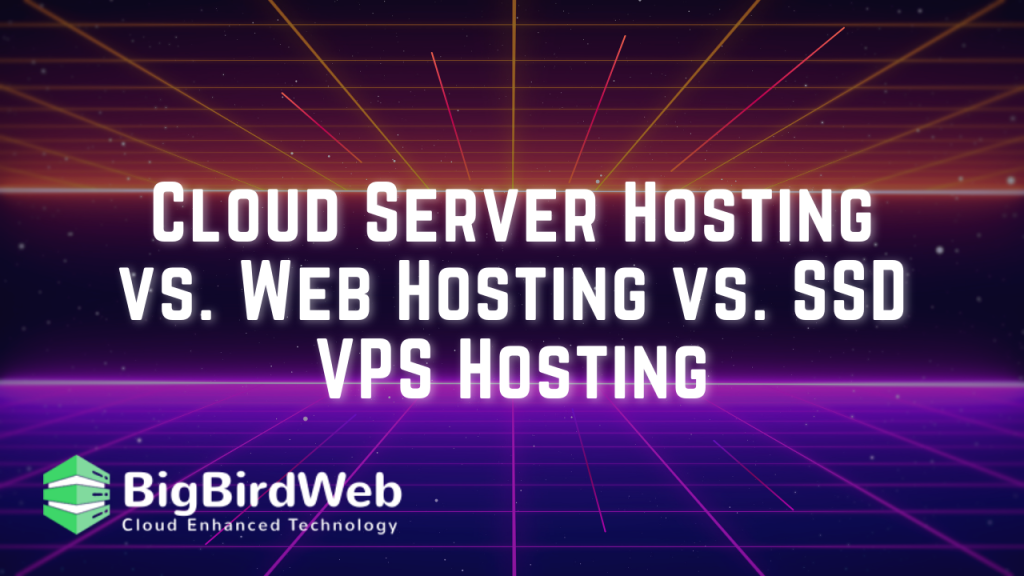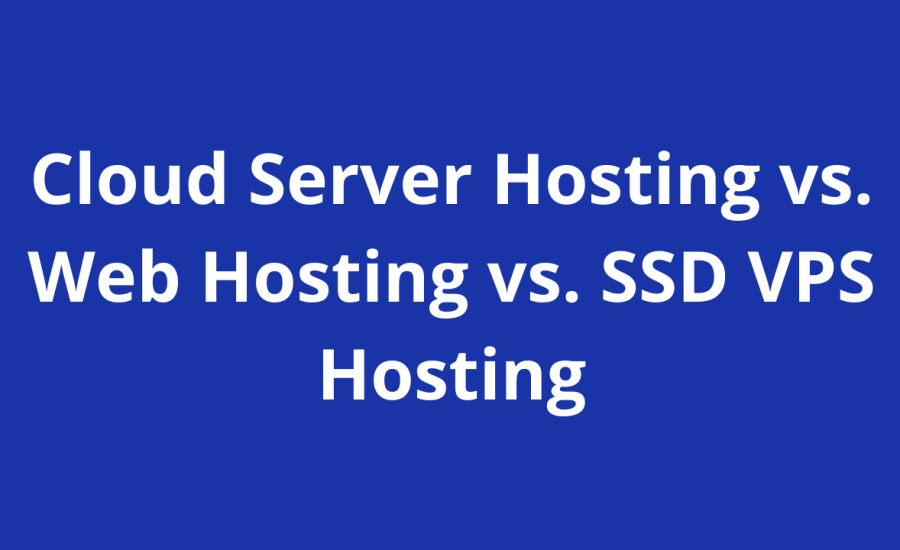When it comes to creating an online presence with Cloud Server Hosting, choosing the right hosting solution is crucial. The performance, security, and scalability of your website depend heavily on the type of hosting you select. In this blog, we will delve into three popular hosting options: Web Hosting, SSD VPS Hosting, and Cloud Server Hosting. By understanding their differences, benefits, and drawbacks, you can make an informed decision that best suits your needs. We will also focus on the best Cloud Server Hosting solutions available in the market.
Table of Contents

Web Hosting
Web Hosting, often referred to as shared hosting, is the most basic and economical form of hosting. It involves sharing a single server with multiple other websites. Each website gets a portion of the server’s resources, such as CPU, RAM, and disk space.
Pros:
- Cost-Effective: Web Hosting is affordable and ideal for small websites and beginners. You can also opt for free web hosting servers.
- Ease of Use: Most Web Hosting plans come with a user-friendly control panel like cPanel, making it easy to manage your site.
- Maintenance: The hosting provider manages server maintenance, updates, and security.
Cons:
- Limited Resources: Since resources are shared among multiple websites, performance can be inconsistent, especially during traffic spikes.
- Security Risks: A vulnerability in one website can potentially affect all other sites on the same server.
- Lack of Scalability: As your website grows, you might outgrow the resources provided by shared hosting.
SSD VPS Hosting
SSD VPS (Solid State Drive Virtual Private Server) Hosting offers a middle ground between shared hosting and dedicated servers. In this setup, a single physical server is divided into multiple virtual servers, each with its own dedicated resources.
Pros:
- Performance: SSDs provide faster read/write speeds compared to traditional hard drives, leading to better website performance.
- Dedicated Resources: Each VPS has its own allocated resources, ensuring consistent performance.
- Scalability: It’s relatively easy to upgrade resources like RAM and CPU as your website grows.
- Control: You get root access, allowing you to install and configure software according to your needs.
Cons:
- Cost: SSD VPS Hosting is more expensive than shared hosting, though cheaper than dedicated servers.
- Management: Requires more technical knowledge to manage and maintain compared to shared hosting.
- Limited Physical Resources: Although virtualized, you’re still dependent on the physical server’s limitations.
Cloud Server Hosting
Cloud Server Hosting, often referred to as the best Cloud Server Hosting, is a highly scalable and flexible hosting solution. It uses a network of interconnected virtual and physical servers to host websites. Resources are distributed across multiple servers, ensuring high availability and reliability.
Pros:
- Scalability: Cloud Server Hosting allows you to scale resources up or down based on demand, making it ideal for growing websites.
- Performance: With resources distributed across multiple servers, your website can handle high traffic with ease.
- Reliability: If one server fails, others in the network can take over, minimizing downtime.
- Flexibility: Pay-as-you-go pricing models allow you to pay only for the resources you use.
Cons:
- Cost: Can be more expensive than other hosting options, especially if you require high resources.
- Complexity: Managing a cloud environment can be complex and might require technical expertise.
- Security: While generally secure, the distributed nature of cloud hosting can introduce potential vulnerabilities if not managed properly.
Comparing Web Hosting, SSD VPS Hosting, and Cloud Server Hosting
To better understand the differences, let’s compare these hosting options based on key factors:
Performance
- Web Hosting: Basic performance, affected by the activity of other websites on the same server.
- SSD VPS Hosting: Improved performance with dedicated resources and SSD storage.
- Cloud Server Hosting: Best performance with scalable resources and high availability.
Scalability
- Web Hosting: Limited scalability, suitable for small websites.
- SSD VPS Hosting: Moderate scalability with the ability to upgrade resources.
- Cloud Server Hosting: High scalability, ideal for websites with fluctuating traffic.
Cost
- Web Hosting: Most affordable, suitable for beginners.
- SSD VPS Hosting: Mid-range cost, offering a balance between performance and price.
- Cloud Server Hosting: Can be expensive but offers flexibility in pricing.
Security
- Web Hosting: Shared environment poses higher security risks.
- SSD VPS Hosting: Better security with isolated environments.
- Cloud Server Hosting: Generally secure but requires proper management.
Management
- Web Hosting: Minimal management required, ideal for beginners.
- SSD VPS Hosting: Requires technical knowledge for server management.
- Cloud Server Hosting: Complex management, often requires expertise.
Best Cloud Server Hosting Solutions
When looking for the best Cloud Server Hosting, consider factors like performance, reliability, scalability, and support. Here are some top providers:
1. Amazon Web Services (AWS)
AWS offers a wide range of cloud hosting solutions with exceptional performance and scalability. Their extensive global network ensures high availability and low latency.
2. Microsoft Azure
Azure provides robust cloud hosting with seamless integration with other Microsoft services. It’s a great option for businesses already using Microsoft products.
3. Google Cloud Platform (GCP)
GCP offers powerful cloud hosting solutions with advanced AI and machine learning capabilities. Their network infrastructure ensures fast and reliable performance.
4. DigitalOcean
DigitalOcean provides user-friendly cloud hosting with transparent pricing. It’s ideal for developers and small to medium-sized businesses.
5. Linode
Linode offers affordable and reliable cloud hosting with a focus on simplicity and performance. They provide a variety of plans to suit different needs.
FAQs
Q: What is the best Cloud Server Hosting?
A: The best Cloud Server Hosting depends on your specific needs. Top providers include AWS, Microsoft Azure, Google Cloud Platform, DigitalOcean, and Linode.
Q: How does Cloud Server Hosting differ from traditional Web Hosting?
A: Cloud Server Hosting uses a network of servers to host websites, offering higher scalability, performance, and reliability compared to traditional Web Hosting, which relies on a single server.
Q: Is SSD VPS Hosting faster than Web Hosting?
A: Yes, SSD VPS Hosting is generally faster than Web Hosting because it uses SSD storage and provides dedicated resources, leading to better performance.
Q: Can I upgrade my hosting plan as my website grows?
A: Yes, both SSD VPS Hosting and Cloud Server Hosting offer scalability options, allowing you to upgrade resources as your website grows.
Q: Is Cloud Server Hosting suitable for beginners?
A: Cloud Server Hosting can be complex and may require technical expertise. However, many providers offer managed services to help beginners.
Bonus Content: Choosing the Right Hosting for Your Needs
Selecting the right hosting solution depends on various factors, including your website’s size, traffic, and technical expertise. Here’s a quick guide to help you decide:
- For Small Websites or Blogs: Web Hosting is a cost-effective and user-friendly option.
- For Growing Websites: SSD VPS Hosting offers a good balance of performance and price.
- For High-Traffic or Resource-Intensive Sites: Cloud Server Hosting provides the scalability and reliability needed to handle fluctuating traffic.
Conclusion
Choosing the right hosting solution is crucial for the success of your website. While Web Hosting is suitable for beginners and small websites, SSD VPS Hosting offers better performance and scalability. For those seeking the highest level of performance, scalability, and reliability, the best Cloud Server Hosting is the ideal choice. Evaluate your needs, budget, and technical capabilities to make an informed decision and ensure your website’s success.
